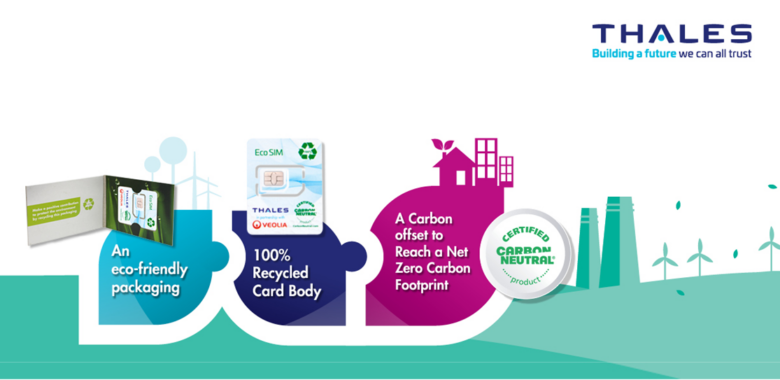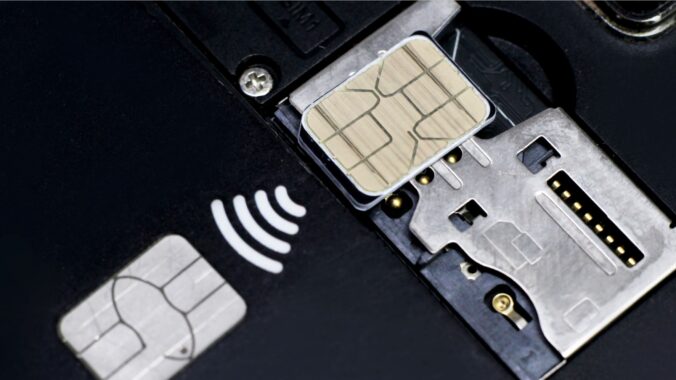This is equivalent to 20,000 tons of polymers – the weight of almost 2 Eiffel towers or 40 Airbus A380s at take-off.
Inevitably most of these SIM cards will end up as waste. However, there is another way. In this blog we’ll be looking at the efforts being made to make SIM cards greener.
Commitment to going green
At Thales we have an unrivalled, ecological SIM portfolio that is aimed at mobile operators looking for sustainable strategies to reduce the environmental impact of their SIM activity, while improving brand awareness in front of their end customers.
We have a long history in this area, so to recap some of our key milestones:
2009 – We measured our first global footprint in 2009, and as a result started engaging in different action plans to address our most important emissions sources.
2014 – In order to cut down on wastage we introduced the Half SIM Trio as early as 2014, but our best development was yet to come…
2020 – In 2020 we partnered with Veolia, the global leader in optimized resource management, to co-develop the world’s first EcoSIM. This venture resulted in the first eco-designed SIM card made from 100% post-consumer recycled plastic…. From discarded fridges to be exact.
Turning old fridges into new SIM cards
After three years of joint development, Thales and Veolia mastered the process of turning polystyrene waste from these discarded fridges into pellets that are then used to manufacture the SIM card body.
This eco-designed product is part of an innovative offer (which includes the eco-friendly Eco Touch SIM packaging) for telecom operators looking for real sustainable strategies to reduce the impact of their SIM card activity.
So just how exactly does a fridge get turned into a SIM card? Watch here to find out:
Completing the offer with ecofriendly packaging
With more than 300 million packs delivered each year and more than 30 years of experience in the telecommunications sector as the world’s number one provider of SIM packaging, we’ve designed an ecofriendly packaging offer with:
- Vegetal & water-based inks for safer products
- Small and smart layouts to reduce paper consumption
- Recycled papers to decrease waste and PEFC or FSC Certified papers to protect forests
EcoSIM, the world’s first certified carbon neutral SIM card
On top of the recycled card body itself, Thales commits to offsetting the carbon footprint of the other components of the SIM (such as the chip) in order to achieve a controlled environmental impact.
Our eco-designed SIM card is a CarbonNeutral® certified product in accordance with The CarbonNeutral Protocol – the global standard for carbon-neutral programs. The carbon footprint of each SIM has been calculated and offset through a program that supports impactful emission reduction projects – such as energy savings and renewable energy development in developing countries.
For this launch received a “Best Practice on Circular Economy” award from telecom operator sustainability association JAC, in recognition of our consistent approach regarding environmental impact reduction in products. This award was given in recognition of everything through from the recycled card body, half card, energy efficiency of sites, renewable electricity sourcing, carbon offset offer, and life cycle assessment tool for the eco-design of the SIM products.
Increasingly, it’s important for companies to take a “Life Cycle” approach to product design.
What is “Life Cycle” thinking?
Life cycle thinking is a holistic approach to tackling the environmental impact of products beyond manufacturing. This style of thinking considers the processes involved in the use of a product from the point of its creation to the end of its useful life.
Here at Thales, we use this approach for the development of our eco-designed products where raw materials extraction, material processing, transportation, distribution, consumption, reuse/recycling, and disposal are examined to reduce at its minimum the carbon footprint impact. Thanks to our factories scattered around the world, we’re able to produce SIM cards as close as possible to our customers by producing the minimum carbon emission.
Want to hear more about our eco initiatives?



